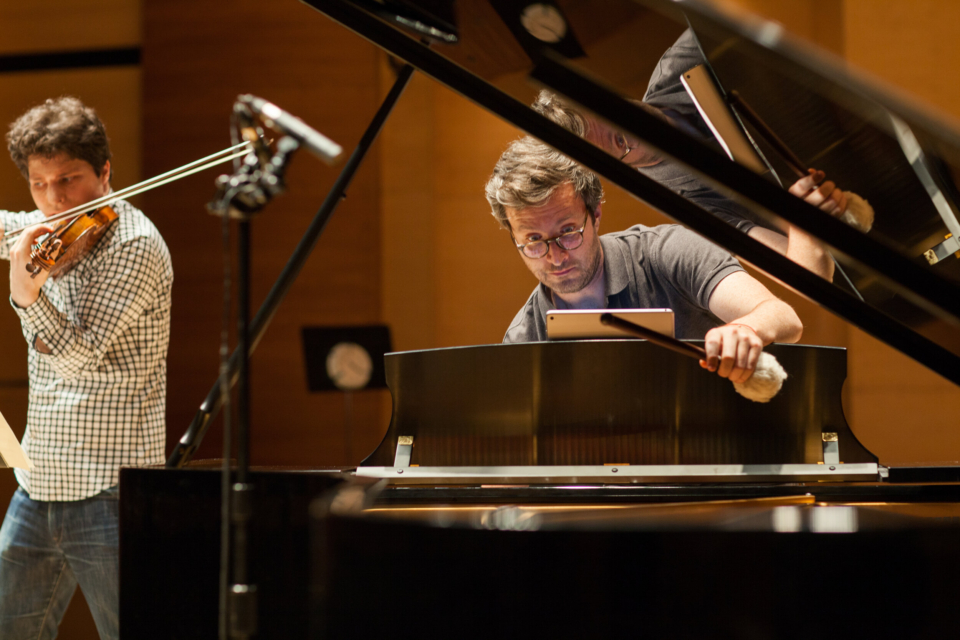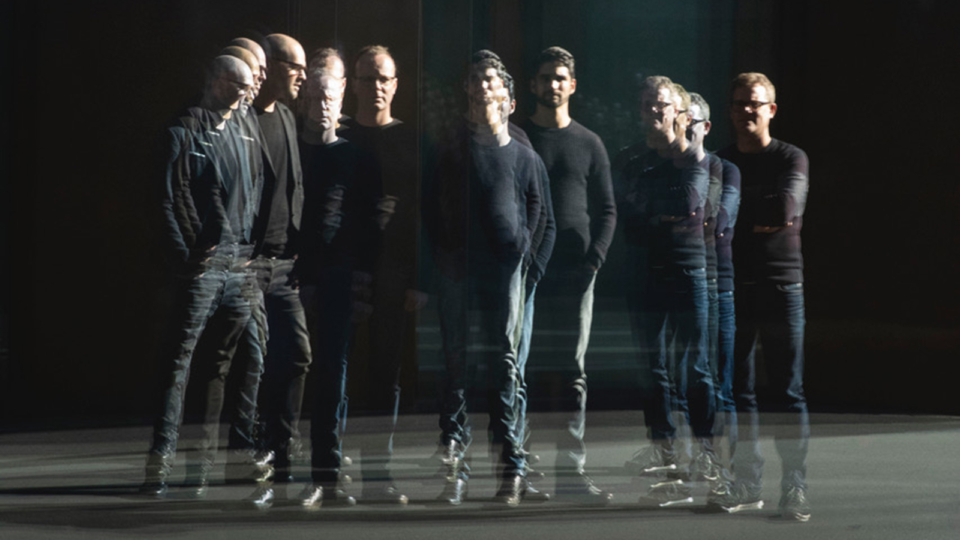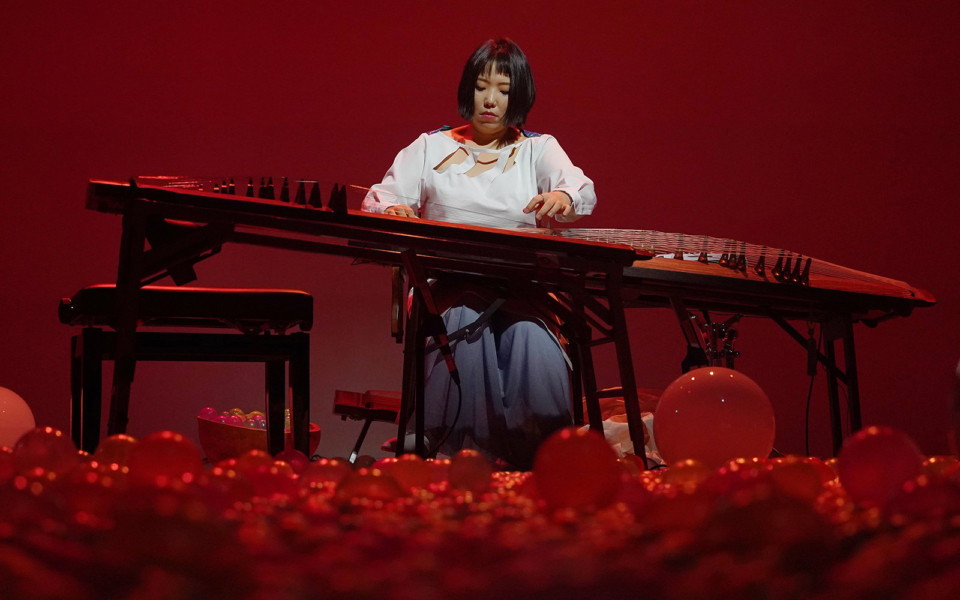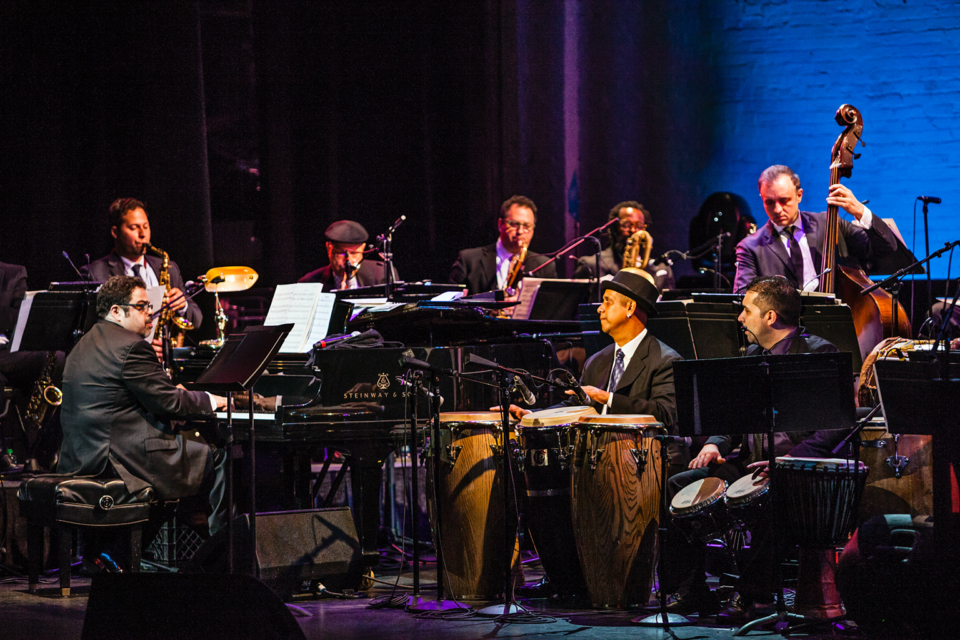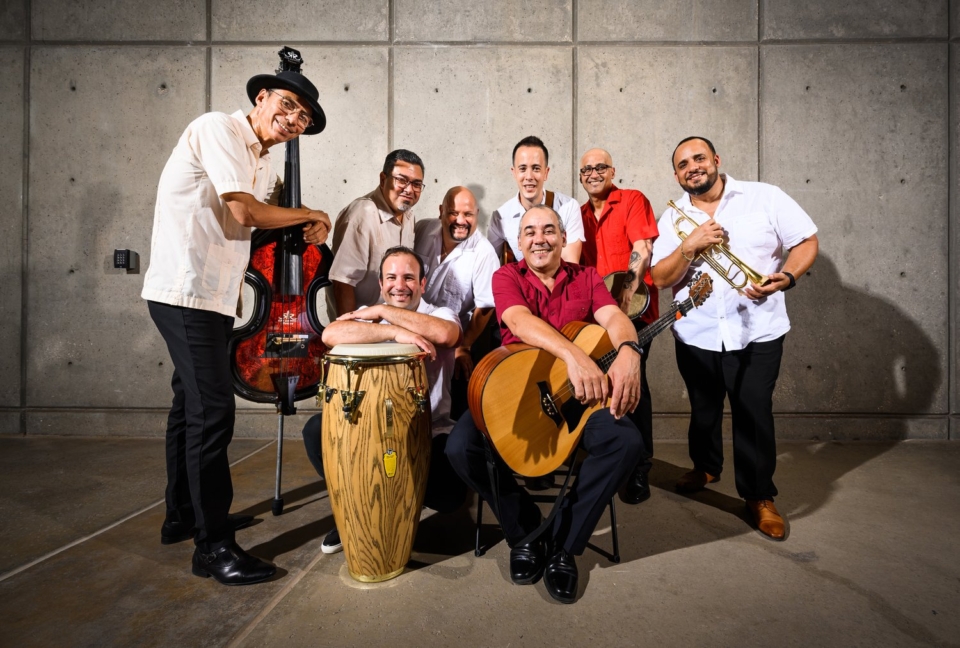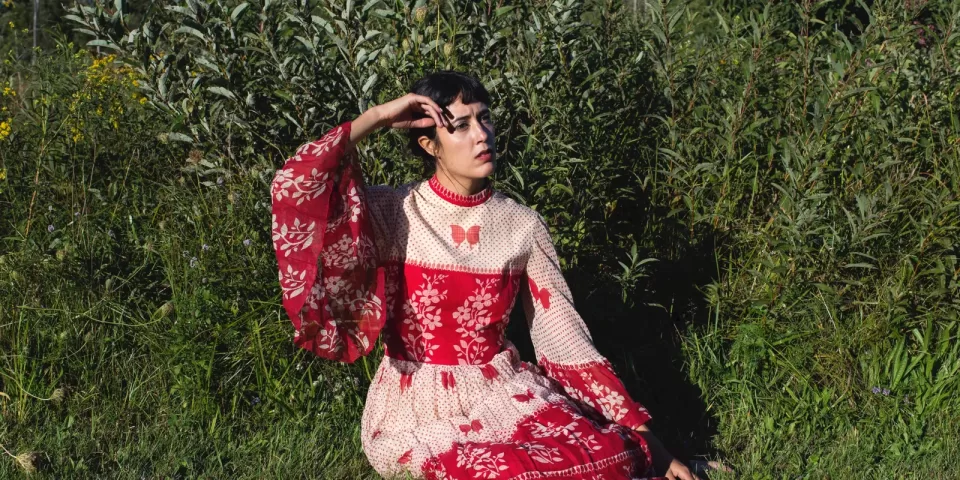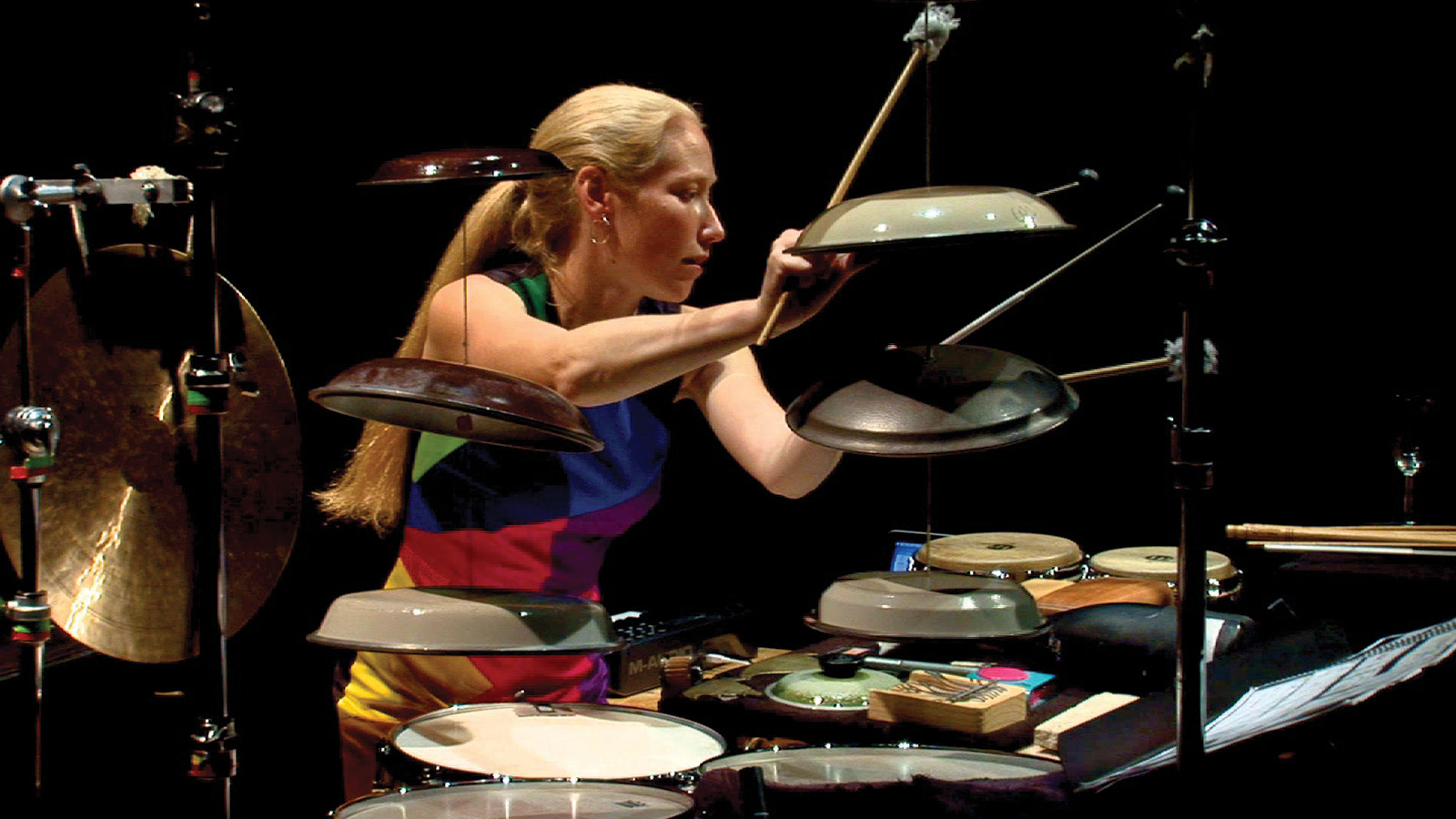
August 21, 8 pm, PS21 Pavilion Theater
HOUSE BLEND IV:
Wang Lu’s Stages (2023) for solo speaking/singing percussionist, performed by Bonnie Whiting, with stage design by Polly Apfelbaum.
Wang Lu’s music that incorporates urban environmental sounds, linguistic intonation and contours, traditional Chinese elements, and free improvisation.
Composed collaboratively with Whiting, with a text adapted from Lucy Corin’s story, “Questions in Significantly Smaller Font.” The work grew out of their memories of confusion and struggle, Wang Lu as a Communist Young Pioneer in China and Whiting caught between family and religious extremism. The work uncovers and explores hidden stages of consciousness, expressed through sounds, physical movement, vocalizations, and text recitations, employing familiar objects such as pot lids, infant music boxes, radios, solo cups, thermal sheets as musical instruments.
Additional programming TBD
House Blend is PS21’s annual chamber music series exploring a full range of adventurous music and creative modes of expression, fostering new collaborations specific to our place, venue, and audiences.
Bonnie Whiting
Her debut album, featuring an original solo-simultaneous realization of John Cage’s 45′ for a speaker and 27’10.554” for a percussionist, was released by Mode Records in April of 2017. Her sophomore album Perishable Structures, launched by New Focus Recordings in 2020, places the speaking percussionist in the context of storytelling and features her own music as well as works by Vinko Globokar, Frederic Rzewski, Richard Logan-Greene, and Susan Parenti.
Recent work includes performances as a percussionist and vocalist with the Harry Partch Ensemble on the composer’s original instrumentarium, and a commission from the Indiana State Museum’s Sonic Expeditions series for her piece Control/Resist: a site-specific work for percussion, field recordings, and electronics. She recently performed in the small chamber group premiering the multimedia opera The Ritual of Breath Is the Rite to Resist (co-commissioned by The Hopkins Center for the Arts at Dartmouth College, and Stanford Live at Stanford University.) Whiting has an ongoing relationship as a soloist with the National Orchestra of Turkmenistan via the U.S. Embassy Cultural Affairs Office, playing concerti in Ashgabat in 2017 and 2018. She performs frequently with percussionist Jennifer Torrence, giving concerts of new experimental work for speaking percussionists throughout Norway and the US. Her collaboration with multimedia artist Afroditi Psarra generated the album < null_abc>, released on the Zero Moon label in 2018, and their current project with designer Audrey Desjardins on transcoding data from IoT devices as performance received a 2019/20 Mellon Creative Fellowship. This project was explored in a workshop at the 2020 Transmediale Festival in Berlin, and currently lives as an interactive net art installation. In 2022 she premiered Through the Eyes(s): an extractable cycle of nine pieces for speaking/singing percussionist collaboratively developed with composer Eliza Brown and ten incarcerated women, and gave the first performance of a new percussion concerto by Huck Hodge with the Seattle Modern Orchestra. 2023-24 brings the world premiere of a new solo speaking percussionist work by composer Wang Lu, recording and performance projects of original improvised music with clarinetist James Falzone and pianist Lisa Cay Miller, concerto appearances with Northwest Sinfonietta, and continued work on the Ritual of Breath project.
Whiting has presented solo and small ensemble shows at The Stone in New York, the Brackish Series in Brooklyn, The Lilypad in Boston, The New York City Electroacoustic Music Festival, at Hallwalls in Buffalo, the Tiny Park Gallery in Austin, The Wulf in LA, the Carl Solway Gallery in Cincinnati, The Grove Haus in Indianapolis, on the Wayward Music Series in Seattle, on tour throughout New Zealand, and at colleges and universities around the country. Whiting is a core member of the Seattle Modern Orchestra and the Torch Quartet, and she has collaborated with many of today’s leading new music groups, including red fish blue fish percussion group, (George Crumb’s Winds of Destiny directed by Peter Sellars and featuring soprano Dawn Upshaw for the Ojai Festival), eighth blackbird (the “Tune-in” festival at the Park Avenue Armory), the International Contemporary Ensemble (on-stage featured percussionist/mover in Andriessen’s epic Die Materie at the Park Avenue Armory, and the American premiere of James Dillon’s Nine Rivers at Miller Theatre), Talea Ensemble (Time of Music Festival in Finland), Bang on a Can (Steve Reich’s Music for 18 Musicians for the LA Philharmonic’s Green Umbrella Series) and Ensemble Dal Niente (the Fromm Concerts at Harvard.) She attended Oberlin Conservatory (BM), the University of Cincinnati College-Conservatory of Music (MM), and the University of California San Diego (DMA.).
Wang Lu
Wang Lu composes music that incorporates urban environmental sounds, linguistic intonation and contours, traditional Chinese elements, and free improvisation. A 2014 Guggenheim Fellow, her work has been performed by many orchestras and ensembles, including Nouvel Ensemble Moderne, the New York Philharmonic, Chicago Symphony Orchestra, Minnesota Orchestra, and Boston Lyric Opera.
Composed collaboratively with Whiting, with a text adapted from Lucy Corin’s story, “Questions in Significantly Smaller Font.” The work grew out of their memories of confusion and struggle, Wang Lu as a Communist Young Pioneer in China and Whiting caught between family and religious extremism. The work uncovers and explores hidden stages of consciousness, expressed through sounds, physical movement, vocalizations, and text recitations, employing familiar objects such as pot lids, infant music boxes, radios, solo cups, thermal sheets as musical instruments.
Polly Apfelbaum
Polly Apfelbaum is a Hudson Valley-based artist whose kaleidoscopic works feature lively color, geometric forms, and non-representational subjects, incorporating textiles, clay, found objects, and other tactile elements traditionally associated with craft and domesticity.


